Morgan Freeman, the veteran actor doomed to play himself: ‘Once you become a star, you’re screwed’
At 86 years old, the unforgettable star of ‘Driving Miss Daisy’ and ‘The Shawshank Redemption’ has not slowed down although his days as a Black actor in surprising roles are long gone
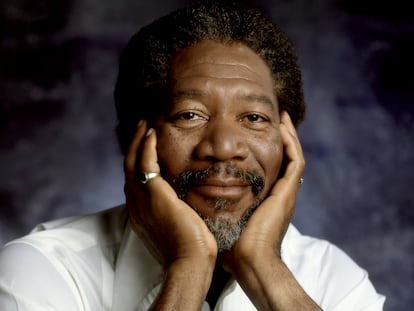
People who are bothered by changes in gender or race in film adaptations often blame Hollywood’s embrace of woke culture. Recent targets of their ire: the 2023 remake of The Little Mermaid and the prequel to The Lord of the Rings. However, Morgan Freeman’s diverse career can shed light on this issue. For instance, in The Shawshank Redemption (1994), Freeman portrayed “Red” Redding, a character originally described as a red-haired Irishman in Stephen King’s story. He also played a character in Kevin Costner’s Robin Hood: Prince of Thieves (1991) who wasn’t part of the traditional legend. Despite not fitting the typical image of the God of the Bible, Freeman portrayed him twice, and also did three turns as president of the United States before Barack Obama was elected.
Freeman’s first presidential term was in Deep Impact (1998). When director Mimi Leder suggested his name, a studio executive rejected the idea, saying “they weren’t doing science fiction.” It was an especially significant role for an actor who began his career during the Hays Code era, a self-imposed industry set of guidelines for all the motion pictures that were released between 1934 and 1968. The code banned the depiction of interracial relationships and restricted roles for Black actors. “When I was little, there was no me in the movies,” he said in an interview for Esquire. “Whenever there was a Black man in a movie, it was usually for laughs. Then Sidney Poitier came along and showed young Black folks that we could take on different roles too.”
Black, not African American. Freeman hates that term. “Two things I can say publicly that I don’t like: Black History Month is an insult. You’re going to relegate my story to a month?” he declared a couple of years ago. “Also, African American is an insult. I don’t subscribe to that title... What does it really mean? Most Black people in this part of the world are mongrels. And you say Africa as if it’s a country, when it’s a continent, like Europe.”
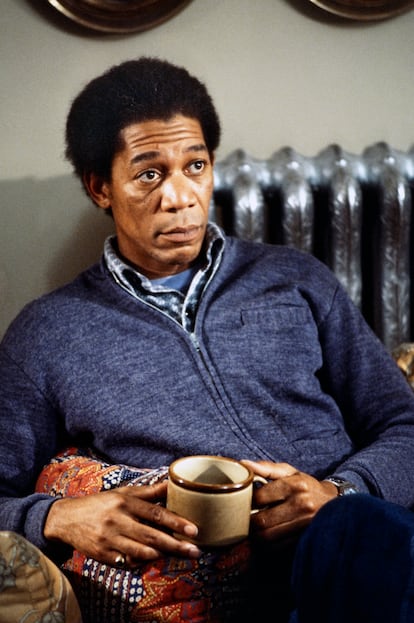
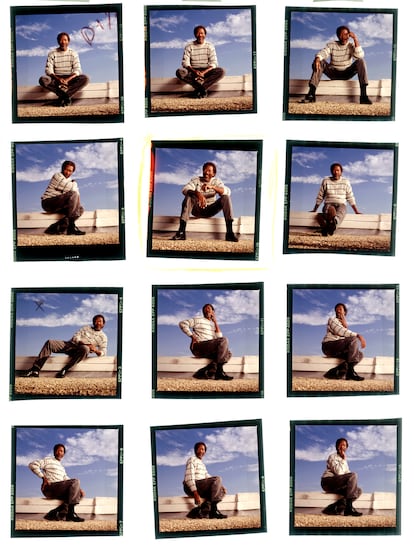
Having started his career six decades ago, he has observed industry transformations that have rendered it unrecognizable. “The thing is, now we’ve got everyone in on it. Like, everyone. LGBTQ, Asian, Black, white, interracial marriages, interracial relationships — they’re all in the mix. You see them all up on the screen, and that’s a huge leap.”
Freeman discovered his calling very early in life. The son of a teacher and an alcoholic barber, he was going to be a dancer until he enlisted in the military. “When I was sixteen, I decided I wanted to become a fighter pilot,” he told an interviewer from Dutch film magazine Preview. “I wanted to be in the military. I wanted to be a warrior. But when I came closer to the realization of that dream — I was 21 and sitting in the cockpit of a fighter trainer — I suddenly knew that my dream was a romanticized version of war, made by movies. I really wanted to make movies about it. I didn’t really want to do it. It was a life-changing epiphany. I only had those two ambitions and one of them was false.”
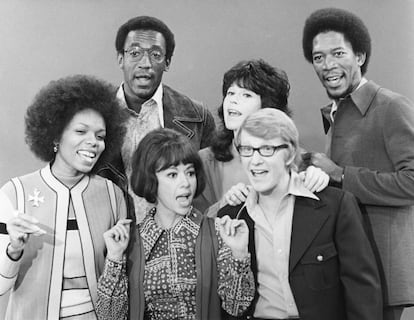
His first big role came in The Electric Company, an educational children’s television series that included stars like Rita Moreno and Bill Cosby. It was a job with exhausting hours that Freeman finally left after almost 800 episodes to work in some Shakespeare theater productions. His early movie roles were mostly in prison settings. Freeman starred alongside Robert Redford in Brubaker (1980), and he also appeared in Attica (1980), a TV film about the New York prison riots. He caught the public eye in Eyewitness (1981), sharing the screen with emerging stars Sigourney Weaver and William Hurt. In Street Smart (1987), he portrayed a character typically given to Black actors — a dangerous and arrogant criminal — earning his first Oscar nomination. While praised by critics, he chose not to pursue similar roles. “I refused. When you do something like that, you get lots of offers to play the same role in other movies. But I didn’t want to do that. If I’m good in something, I don’t want to do it again — I want to try something new.”
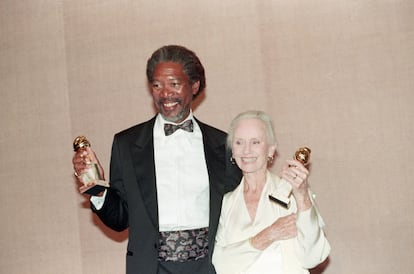
The role that led to his next Oscar nomination was quite different. His character in Driving Miss Daisy (1989), which he had previously played on stage, brought Freeman immense fame. Although he was over 50 by then, Freeman was a fresh, new face to movie audiences. Inspired by a true story, the movie depicted the relationship between a Black chauffeur and an elderly Jewish woman that evolved into a family-like bond. It was a huge success, won four Oscars (out of nine nominations) and grossed $145 million worldwide. Freeman was now a star, which led to a role in Kevin Costner’s Robin Hood: Prince of Thieves created specifically for him.
Freeman began to show up in unconventional settings for Black actors, like Clint Eastwood’s Western, Unforgiven (1992). His casting as Red in The Shawshank Redemption came as a surprise. Freeman was suggested for the role in the fan favorite by producer Liz Glotzer. In Stephen King’s novella, Red is a white Irishman with red hair, hence the nickname. Screenwriter and director Frank Darabont initially considered Gene Hackman and Robert Duvall for the role, but their unavailability led him to heed Glotzer’s advice. When Freeman learned of their interest, he was thrilled. “Shawshank was an absolutely delightful script,” the actor told Vanity Fair. “So I called my agent and said, ‘It doesn’t matter which part it is — I want to be in it.’ He said, ‘Well, I think they want you to do Red.’ And I thought, Wow, I control the movie!”
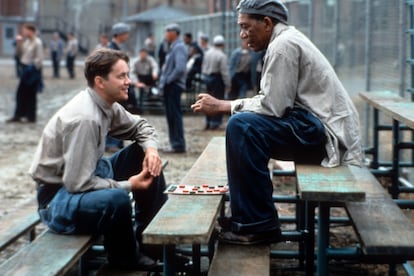
Freeman was the focal point of Shawshank, serving as the narrator. His deep voice, a key asset, took the spotlight for the first time, and he subsequently narrated fiction, documentaries and commercials. Freeman’s Visa commercials were very successful until allegations of “inappropriate behavior” by eight actresses led to contract termination. Colleagues like the late Suzanne Somers defended him, citing his “old-fashioned ways.” The CNN journalist who reported the allegations was eventually accused of falsifying material for the story, yet the damage to Freeman’s reputation had already cost him several sponsorships.
Another scandal that touched Freeman was when the granddaughter of his first wife, E’Dena Hines, was tragically murdered by her boyfriend in 2018. Initially thought to be an exorcism gone wrong, the murder was later revealed to be a jealous rage — she was stabbed 25 times in broad daylight on a New York City street. The boyfriend and murderer alleged that the aspiring actress had been sexually abused by Freeman when she was younger, which he vehemently denied.
The actor everyone likes
Freeman, known for his moderate temperament and kindness, has always risen above the often vicious Hollywood gossip and rumors. Already a star in the early 1990s, he worked with Brad Pitt in David Fincher’s Seven (1995), which paved the way for more roles in crime thrillers. He progressed to playing a U.S. president in Deep Impact (1998) and God in Bruce Almighty (2003). Despite his on-screen star power, Freeman’s career was still lacking major awards. That came by way of his old friend, Clint Eastwood.
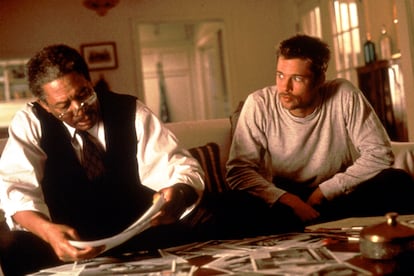
If the Freeman-Eastwood collaboration in the dark Unforgiven was a success, so would be his role as a former boxer with holey socks who convinces an aging trainer (Eastwood) of an aspiring boxer’s potential. Million Dollar Baby (2004) starts as a tale of personal growth, evolving into a powerful contemplation of euthanasia, earning Freeman his first Oscar. He would receive his most recent nomination in another Eastwood film — Invictus (2009) — in which he played South African President Nelson Mandela. In between, he found time for the modern rite of passage (for actors): starring in a superhero blockbuster as Lucius Fox in Christopher Nolan’s Batman trilogy.
Freeman’s indifference to awards is evident in his extensive filmography: with over 120 titles, ranging from masterpieces to forgettable ones. He once told Esquire that some roles are just to “pay the rent.” Freeman’s signature gold earrings, inspired by Burt Lancaster in The Crimson Pirate, hold sentimental value. “They’re worth enough to buy me a coffin in some faraway land,” he once told The Talks. “That’s why sailors used to wear them.”
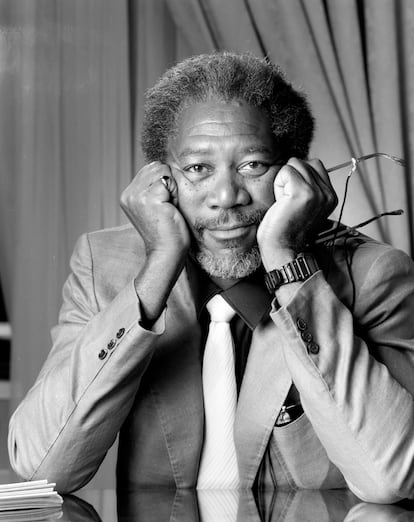
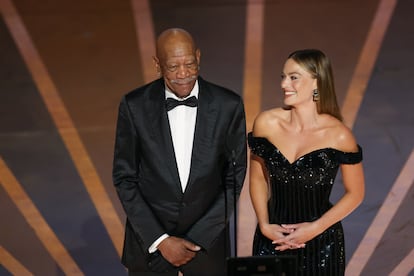
At 86 years old, Freeman continues to work at a steady pace. His most recent movie — 57 Seconds — is a 2023 science fiction thriller film co-starring Josh Hutcherson. The actor knows that people don’t call him anymore to give life to great characters, but to be himself. “When my film career started, I wanted to be a chameleon. Like De Niro’s very different roles when he was younger. But as you get older in this business and become a star, you’re pretty much screwed in terms of being a character actor. You’ve played the same role too many times. The people who hire you say, ‘I want Morgan Freeman,’ and you live with it.”
Sign up for our weekly newsletter to get more English-language news coverage from EL PAÍS USA Edition
Tu suscripción se está usando en otro dispositivo
¿Quieres añadir otro usuario a tu suscripción?
Si continúas leyendo en este dispositivo, no se podrá leer en el otro.
FlechaTu suscripción se está usando en otro dispositivo y solo puedes acceder a EL PAÍS desde un dispositivo a la vez.
Si quieres compartir tu cuenta, cambia tu suscripción a la modalidad Premium, así podrás añadir otro usuario. Cada uno accederá con su propia cuenta de email, lo que os permitirá personalizar vuestra experiencia en EL PAÍS.
¿Tienes una suscripción de empresa? Accede aquí para contratar más cuentas.
En el caso de no saber quién está usando tu cuenta, te recomendamos cambiar tu contraseña aquí.
Si decides continuar compartiendo tu cuenta, este mensaje se mostrará en tu dispositivo y en el de la otra persona que está usando tu cuenta de forma indefinida, afectando a tu experiencia de lectura. Puedes consultar aquí los términos y condiciones de la suscripción digital.









































